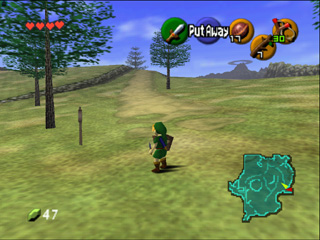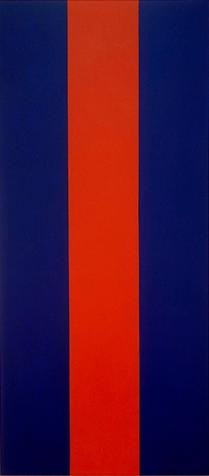
What makes Ocarina of Time unique in the Legend of Zelda series is that it is the first to take place in 3-D. The previous games took place on systems with little or no capacity for 3-D graphics, and Link would travel the kingdom as seen from above, displayed on a 2-D map. The gameplay in three dimensions allowed the player the ability to move their character in 360 degrees of motion; moreover, new features were introduced, like the ability to lock on to moving targets and context-sensitive buttons that would become staples of adventure gaming.
The Wind Waker was released in 2003 in most territories, 5 years after the 1998 release of Ocarina of Time. It innovated, as well: the game featured stylish cel-shaded graphics, the ability to pick up and use some enemy weapons and a new sailing mechanic that involved controlling the wind. Yet, it featured essentially the same control scheme found in the Ocarina of Time from 1998, and walking, running, attacking, automatic defending and automatic jumping are unmodified.


Reviews for the game were very positive, though most sources noted that Wind Waker didn't feel as fresh as Ocarina of Time did, and reviews weren't as great as for Ocarina of Time. This bothered my friend. "Wind Waker is a better game," he argued. "Why does Ocarina of Time get the high placements on best-of lists?" Dissuading most criticisms of Wind Waker, he argued that it looked and played better than Ocarina of Time did. "What impact does originality have on gameplay?"
I disagreed with what he said, and argued with him. Innovation does matter!, I cried. Problem was, I couldn't really say why. Having played Wind Waker only briefly, I couldn't offer too much as to why the game would be better or worse. If Wind Waker was a 'better' game, then it should deserve more respect...but no. I couldn't put my finger on it, but originality was important, too. Erm...quality didn't really matter! Ocarina of Time did it first!
"So what?" My friend asked. "What impact does that have on gameplay?" Wind Waker did it better, he'd say.
We didn't reach a conclusion in that argument, but I've given it some thought, and I think I know now why originality is so much more important in the grand scheme of things.

Consider the painting Voice of Fire. It's a simple-looking painting, featuring two big, long strips of blue paint surrounding a single strip of red. It caused contraversy when the National Gallery of Canada bought it for 1.8 million dollars (http://en.wikipedia.org/wiki/Voice_of_Fire). It was easy to look at a painting of a red stripe on blue background and think it was an unworthy purchase, but Voice of Fire is unique. I saw the painting on a trip to Ottawa a few years back, and it generates a unique effect in person: if you look at the painting in a certain way, waves of red leap from the sides of the red stripes like fire, and it's an amazing thing to see. The little .jpg you see here does not do it justice. I suppose any painter could have made the three-coloured painting in a way that created such an effect, but the artist, Barnett Newman, did. If someone were to make a perfect recreation of Voice of Fire today, no art institution would purchase it, let alone for 1.8 million. Just because something can be done, and improved upon, doesn't make it better, as being the first with an original concept has a value all its own.
Let me put this another way, for game owners. The football game series Madden comes out with a new game every year, and adds a number of changes or improvements to the previous installment, along with routine changes like updates to the NFL rosters. I have a friend who jokes that the only thing they change from year to year in the games is the number on the box. It's not true, of course, but it got me thinking: what if one year, a Madden game made almost no changes at all? What if they went into Madden NFL 10, made the grass look better, updated the rosters, and released the game as Madden NFL 11? They could advertise that the game was strictly better than its predecessor, and featured updated graphics. They'd be right; however, people would hate it. The game would receive dreadful reviews, fans would express outrage, and it would sully the brand name. Each Madden game has attempts to update gameplay, adds new features, and, well...innovate. Even if the graphics in Madden NFL 11 were improved dramatically, if the gameplay remained unchanged, people would be disappointed.
Now, the Wind Waker is not strictly better than Ocarina of Time. It does actually innovate, and considering that the game has an average critic score of 96/100 on Metacritic, which aggregates reviews, it certainly isn't considered a terrible game by any means (http://www.metacritic.com/games/platforms/cube/legendofzeldathewindwaker?q=wind%20waker). In fact, a number of critics who have played rereleases of Ocarina of Time found the game dated, at least graphically (http://cube.ign.com/articles/387/387479p2.html). But even if we accept that Wind Waker is a better game in terms of graphics, gameplay, music...on every physical level, Ocarina of Time can still be considered a better game, if we accept that it is more innovative. Such things are subjective, but since an innovative game will likely make a big impact on a player, we can expect to see Ocarina of Time place higher on best-of lists for years to come...much to my friend's chagrin.

Haha, good old Zelda ^^
ReplyDeletepersonally I like Majora's mask the most because of the time play but I like pretty much all Zelda... but I also played Majora's mask first because I never had the 64 originally and played it on someone else's system
there's just something about Nostalgia, favorites, and memory that is hard to be defined, more than any science on neural networks and imprints will ever really explain